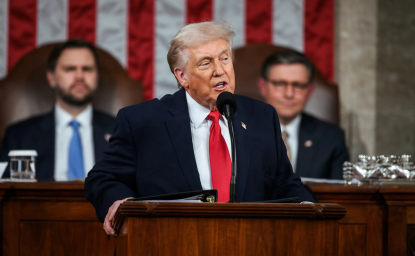Wilson at 150
The Woodrow Wilson Center held a series of events to commemorate the 150th birthday of President Woodrow Wilson culminating in a daylong seminar to reflect on his life and presidency.
The Woodrow Wilson Center held a series of events to commemorate the 150th birthday of President Woodrow Wilson culminating in a daylong seminar to reflect on his life and presidency.
Woodrow Wilson, our nation's 28th president and the namesake of this research institution, was born on December 28, 1856. The 150th anniversary of his birth presents the opportunity to reflect on his life and presidency, his strengths and shortfalls, his contributions and legacy.
To commemorate Wilson's 150th birthday, the Woodrow Wilson Center, in conjunction with the Woodrow Wilson House, held a series of events in recent weeks including an exhibit in the Center's lobby, a new film in its theatre, and the display of Wilson's 1923 Rolls Royce on its plaza. The culminating event was the daylong Wilson at 150 National Symposium, featuring presentations by renowned academics and historians that will be incorporated into a book.
Before becoming president in 1913, Woodrow Wilson had been a lawyer, a professor, president of Princeton University, and governor of New Jersey. "It is a fine system where some remote schoolmaster may become president of the United States," he once said. Wilson earned his doctorate at Johns Hopkins University and is the only U.S. president to hold a Ph.D. He was the first democrat since Andrew Jackson to win a second consecutive term and the last president to write his own speeches.
Revered for his accomplishments, though at times his tenets were controversial, Wilson undoubtedly was a consequential president, one whose ideals and values still reverberate throughout this Center and throughout the world.
Domestic Policy
"Woodrow Wilson was one of the greatest legislative leaders ever to sit in the White House," said John Milton Cooper, professor at the University of Wisconsin-Madison and a lifelong scholar of Wilson. "In the first 18 months of his presidency, he oversaw and pushed through a truly staggering program of major legislation."
During that period, Wilson's administration lowered tariffs, instituted the first permanent income tax; created the Federal Reserve Bank and the Federal Trade Commission; and passed antitrust legislation to protect unions. To accomplish this mammoth agenda, he kept Congress in session for 18 months straight, with only a brief recess, an unprecedented move.
The second major legislative push of his New Freedom program came in 1916—the final year of his first term—when he instituted federal child labor laws, levied the first graduated income tax, and implemented the first agricultural subsidies and an eight-hour workday for railroad workers. That year, in another bold move, his nominee to the Supreme Court was Louis Brandeis, who became the Court's first Jewish justice.
Wilson was often described as a solitary, stubborn man, but numerous scholars stressed that he consistently listened to the public and consulted his peers before making important decisions. Wilson had said, "I not only use all the brains that I have, but all that I can borrow." During his presidency, he gave weekly off-the-record press conferences and was the first president since John Adams to deliver the State of the Union address in person. In the end, he appeared before Congress more often than any other president.
Wilson worked tirelessly on domestic issues even as foreign policy pressures mounted. He once said, "Progressiveness means not standing still when everything else is moving."
Foreign Policy
"It would be an irony of fate if my administration had to deal chiefly with foreign affairs," Wilson had said. As fate would have it, he first faced troubles in Latin America, then took the United States into the Great War in 1917, and ultimately struggled to garner support for a collective security organization.
His first major foreign policy issue was Mexico. Wilson deemed himself the defender of Mexican sovereignty, said Mark Gilderhus, the Lyndon B. Johnson Chair of History at Texas Christian University, but most Mexicans opposed U.S. intervention. Wilson's Mexico policy was one blunder after another, Gilderhus said, and it tormented Wilson throughout his presidency. U.S. foreign policy in Latin America wavered between confrontation and conciliation, ultimately failing to get the desired results.
In 1916, Wilson had mounted a peace campaign, pledging U.S. support in a post-war League of Nations, an effort for which he lobbied until his death. "His pursuit of a non-punitive peace gave the Allies an unprecedented victory," Cooper said.
"President Wilson attempted to create a new world order after World I," said Lloyd Ambrosius, Distinguished Professor at the University of Nebraska. "His approach—known as Wilsonianism—called for peacemaking on the basis of collective security, national self-determination, and "open door" globalization."
In 1918, Wilson outlined his vision for peace in his Fourteen Points, which called for a world more open to international travel, commerce, and finance. The 14th point called for a League of Nations. Wilson wanted an international society that would promote modernization and capitalism, said Ambrosius, but "Wilson's unrealistic vision did not provide the stable peace he foresaw."
If he was alive today, "I think Wilson would say that as a long-term policy, the United States should indeed promote liberal democracy," said Anne-Marie Slaughter, dean of Princeton University's Woodrow Wilson School. "But our focus must be on how to make the process of democratization safe for the world."
Civil Liberties
Wilson touted progressivism and liberal ideas but had a dismal record on civil liberties. "There has never been a period that matches the era of repression put in place by Woodrow Wilson during the first World War," said University of Chicago Law Professor Geoffrey Stone.
Wilson equated wartime dissent with a lack of patriotism. To silence critics, Wilson implemented the Espionage and Sedition Acts of 1917 and 1918 that prosecuted those who criticized the war, the government, or the military, punishable by 20 years in prison. The stiff sentences deterred millions from speaking out, marching, writing editorials, or signing petitions but more than 2,000 Americans were prosecuted under these acts. "This left a scar on his legacy," said Stone.
Another scar came from Wilson's record on race. "Wilson never regarded blacks as equals. He never talked about their rights," said Gary Gerstle, a history professor at Vanderbilt University. "Wilson was deeply racist in thought and politics," much like many other white southerners of his time. He supported segregation as a vehicle to uphold the peace, said Gerstle, and showed contempt to blacks who pushed for equality. He did recognize immigration as a dynamic force in America, said Gerstle, and African American leaders admired this quality and repeatedly reached out to Wilson hoping he would rise above popular prejudices. "But Wilson infuriated and disappointed black leaders," said Gerstle. His policies insured "America would continue to be a white republic."
Wilson also came under negative scrutiny for his "coerced and insincere" support for women's suffrage, said Victoria Bissell Brown, a history professor at Grinnell College. "Though he was political bedfellows with suffragists, he never respected them in the morning." He would publicly endorse women's suffrage from 1915-1918, which gave the cause legitimacy and fueled momentum, but Brown said his support was duplicitous—often playing favorites and violating the free speech of women suffragists he disliked in what she called, "a regrettable handling of the movement."
Wilson certainly had a mixed record, but, as Cooper said, "By the standard of accomplishments, he towers. Even his great failure had a tragic grandeur and has left a lasting legacy." The Center that bears his name was created in 1968, 44 years after Wilson's death, as an institution of advanced research to memorialize Wilson's vision. It's a place where those inside and outside of government can share ideas and think beyond the pressures of partisan advocacy. The Wilson Center convenes policymakers and academics to foster a robust dialogue on key issues in a way that Wilson probably would have liked. It is a place, we believe, that would have made Wilson proud.Wilson Center President and Director Lee H. Hamilton rides in Woodrow Wilson's 1923 Silver Ghost Rolls Royce next to Richard Moe, president of the National Trust for Historic Preservation. Woodrow Wilson House Executive Director Frank J. Aucella rides up front (left).
By Dana Steinberg
Special thanks to public policy scholar Patricia O'Toole, who contributed to this story.


